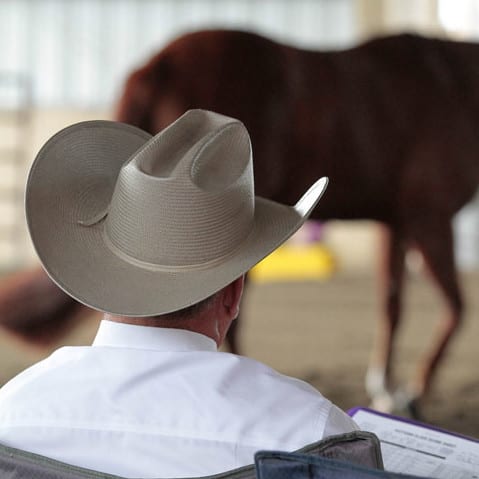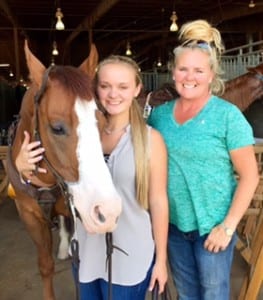In April, GoHorseShow published an article entitled, 10 Things Top Judges Wish Exhibitors Would Realize. That article was very widely received and quickly went viral through our horse show world. The insatiable interest in that subject got us asking about the flip side of that question: What do exhibitors wish judges would realize?
Surprisingly, many of the exhibitors we spoke with had very similar ideas.
It seems when it comes to this side of the question, exhibitors are mainly concerned with only a handful of requests. These requests focus on making the exhibitor feel more comfortable and appreciated and the judge being more clear with their decisions.
We compiled their answers and here are the top seven things that exhibitors wish judges would realize…
A number of people we interviewed said the biggest thing they wish judges would realize is that it would be nice for them to at least appear more approachable.
While exhibitors all said they realize the seriousness of a judge’s job and the stress that comes with it, a lot of them said they want judges to know just how much just an acknowledgment and a smile really mean.
Erin Mask (pictured right), a youth exhibitor from Atlanta, Georgia said, “When judges have a positive demeanor as exhibitors enter the ring it just helps to ease the tension. I think it especially helps to alleviate the stress of the newer exhibitors.”
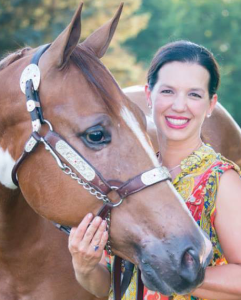 Vanessa Froman (pictured left), an exhibitor from Sawyer, Michigan agreed and cited how much this means to Novice Youth exhibitors, “Just something as simple as greeting them before they do their pattern or enter the pen… the judges can have a sizable impact on our youth. It would be super to see more of them utilizing that power with the kids.”
Vanessa Froman (pictured left), an exhibitor from Sawyer, Michigan agreed and cited how much this means to Novice Youth exhibitors, “Just something as simple as greeting them before they do their pattern or enter the pen… the judges can have a sizable impact on our youth. It would be super to see more of them utilizing that power with the kids.”
Froman said that when she sees this in action at shows, there is an instant difference in the exhibitor (for the positive) and everyone is grateful.
2) Willingness to Answer Questions Are Much Appreciated
Meg DePalma-Whelan (pictured right) of Evans, Georgia said that, “It would be cool to have a judge willing to come out for the Novice Youth and Novice Amateur exhibitors before pattern classes and answer any questions, especially on complicated patterns.”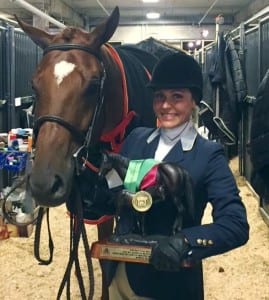
While exhibitors realize this isn’t always possible, especially at the large shows, weekend shows with complicated patterns would be a great avenue for judges to communicate to the novice exhibitors what they are looking for in a performance.
As DePalma-Whelan said, “Not everyone has the luxury of having a trainer. A lot of people show alone and don’t have a trainer to explain the pattern to them. The judge explaining the pattern might be very helpful for those who are nervous or don’t understand a complicated element or maneuver. It would really show that they are trying to help make everyone successful.”
3) Judges Should Utilize the Comment Section of Score Sheets
Then there is the subject of those hieroglyphic looking score sheets.
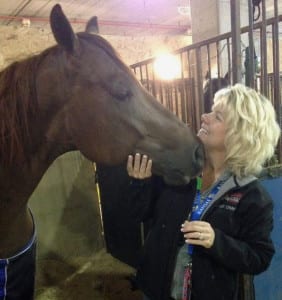 Rebecca Bunting (pictured left) of Wichita, Kansas said, “I wish the judges would comment on their score sheets more. I know it takes extra time but I wish they would realize how much exhibitors go back and look at their sheets, especially the kids.”
Rebecca Bunting (pictured left) of Wichita, Kansas said, “I wish the judges would comment on their score sheets more. I know it takes extra time but I wish they would realize how much exhibitors go back and look at their sheets, especially the kids.”
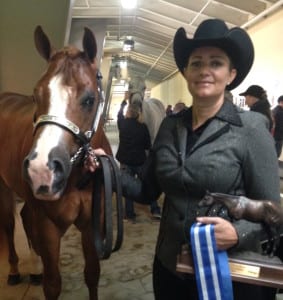 Kathryn deVries Mitchell (pictured right) of Vacaville, California agreed, “When the scores are nearly identical, exhibitors wonder what is making the difference. It would be nice to know what we (as exhibitors) could do differently to mark the score of the exhibitor above us.”
Kathryn deVries Mitchell (pictured right) of Vacaville, California agreed, “When the scores are nearly identical, exhibitors wonder what is making the difference. It would be nice to know what we (as exhibitors) could do differently to mark the score of the exhibitor above us.”
Many of the exhibitors we interviewed said small comments such as “hands too high” would mean so much and be a great learning tool, especially for exhibitors who may have trainers telling them one thing and judges scoring differently.
4) Judges Should Judge the Performance On the Whole
In this day and age, where every class has a score sheet (with the exception of rail/halter classes) exhibitors we interviewed were very concerned with the idea that judges have stopped judging classes on the whole.
Judges are held to st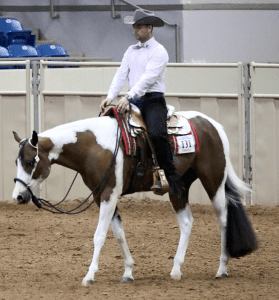 rict standards when it comes to scoring nowadays and while exhibitors don’t blame them for that, there are concerns that have been raised regarding judges missing out on a great horse because of a small mishap that destroys their score.
rict standards when it comes to scoring nowadays and while exhibitors don’t blame them for that, there are concerns that have been raised regarding judges missing out on a great horse because of a small mishap that destroys their score.
Trainer, James Saubolle (pictured left) of Elite Show Horses in Aubrey, Texas said, “Sometimes it feels as though judges are rewarding performances that lack level of difficulty but are clean (especially in Trail) but are at the same time simply penalizing the horse with a greater level of difficulty that may have a tick, yet are not rewarding that level of difficulty.”
Exhibitors realize that they must be penalized for faults but wish judges would still look at the entire performance, not the one thing that they “caught them” on.
Even judges recognize that with the scoring system today, one fault can seriously affect your score. However, exhibitors feel that if their performance was otherwise flawless that should still be considered.
5) Their Pet Peeves Can Be Confusing
One exhibitor posted a really poignant comment when we posted the article on 10 Things Judges Wished Exhibitors Would Realize on our Facebook page.
Gabrial Seymour of Utica, Kentucky said (in part):
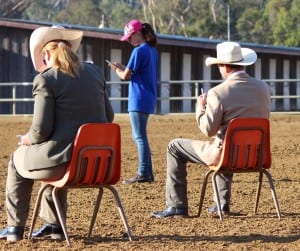 “We as exhibitors have a really difficult time making decisions on show etiquette when many judges disagree. For instance, some judges get annoyed when an exhibitor waits at the cone for all of the judges to get done marking their final comments of the last pattern. Other judges find that to be respectful and considerate. Some judges find it distracting when an exhibitor gives a quick nod before they begin their pattern, others find that to be a sign of acknowledgment. I have also read a lot of judges opinions on dress code, and the preferences among judges are pretty steep and very different from each other. These are things that you can’t always find in the rule book, but can leave negative impressions for some judges. I would like for the judges to know, that it is very confusing for us exhibitors to know what exactly “gets under your skin” when it comes to etiquette because there are major disagreements among judges on these things. We are only trying to do what is courteous and respectful while also trying to express a little bit of individuality, and that may not always hit the mark for each individual judge. As an exhibitor, I would like to believe that I can work hard, be diligent, wear clean, well fitted clothing with a clean, creased hat, have a correct pattern, have a well groomed horse, and make it high on the score cards based upon my performance.”
“We as exhibitors have a really difficult time making decisions on show etiquette when many judges disagree. For instance, some judges get annoyed when an exhibitor waits at the cone for all of the judges to get done marking their final comments of the last pattern. Other judges find that to be respectful and considerate. Some judges find it distracting when an exhibitor gives a quick nod before they begin their pattern, others find that to be a sign of acknowledgment. I have also read a lot of judges opinions on dress code, and the preferences among judges are pretty steep and very different from each other. These are things that you can’t always find in the rule book, but can leave negative impressions for some judges. I would like for the judges to know, that it is very confusing for us exhibitors to know what exactly “gets under your skin” when it comes to etiquette because there are major disagreements among judges on these things. We are only trying to do what is courteous and respectful while also trying to express a little bit of individuality, and that may not always hit the mark for each individual judge. As an exhibitor, I would like to believe that I can work hard, be diligent, wear clean, well fitted clothing with a clean, creased hat, have a correct pattern, have a well groomed horse, and make it high on the score cards based upon my performance.”
While exhibitors realize that we are paying for an individual’s opinion, they are easily confused when a particular nuance they do annoys one judge but not the other. This may be something exhibitors will just have to continue to accept, but they do want judges to realize that this is a pet peeve of theirs.
6) Exhibitors Have Long Show Days, Too
While some exhibitors are specialized and show in just a couple of events, a number of exhibitors still show the all-around and everyone knows that makes for incredibly long days.
Just as long, if not longer than, the judges.
Even if exhibitors are specialized, it usually doesn’t mean they just show up 15 minutes before their class. And if their class is the last class of the day? It’s a lot of hurry up and wait.
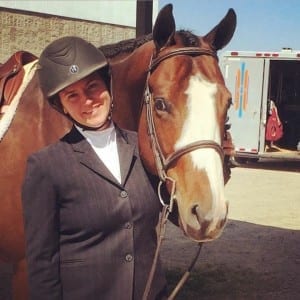 Sarah Elder Chabot (pictured left) of Maryville, Tennessee said, “I think judges have a really hard job. I think most exhibitors realize this. I cannot imagine being on top of it all day long and staying sharp through so many different classes in one day. It really must be daunting. However, I tend to show in the last class of the day, and I too, have been showing or preparing all day… sometimes I get tired. But in order to give a great performance I have to remain positive and sharp. I wish judges would realize this and that judges too, would continue to be positive, nice, and sharp for the last class as they are for the first.”
Sarah Elder Chabot (pictured left) of Maryville, Tennessee said, “I think judges have a really hard job. I think most exhibitors realize this. I cannot imagine being on top of it all day long and staying sharp through so many different classes in one day. It really must be daunting. However, I tend to show in the last class of the day, and I too, have been showing or preparing all day… sometimes I get tired. But in order to give a great performance I have to remain positive and sharp. I wish judges would realize this and that judges too, would continue to be positive, nice, and sharp for the last class as they are for the first.”
Judges have said it before. After a long day, their patience can weaken, they can become more critical, and maybe they aren’t smiling as much.
Just as judges say they notice exhibitors’ attitudes and demeanor, exhibitors want judges to realize they do too… especially at the end of the day.
7) People Still Need to Have Their Own Style
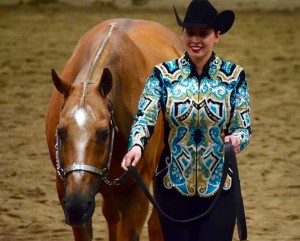 One of the many beautiful things about showing horses is that people recognize, like, and strive to have their own personal style. It is not a robotic sport.
One of the many beautiful things about showing horses is that people recognize, like, and strive to have their own personal style. It is not a robotic sport.
However, going to back to the issue of score sheets and judges’ pet peeves, a number of exhibitors and trainers feel that the pluses and minuses are not consistent. It becomes especially frustrating when you check the score sheets and notice the checks and pluses are the same for two different riders, but the numerical scores are somehow different.
A lot of times they feel this comes down to judges almost being forced into judging robotically and forgetting about style.
 Lynne Puthoff (pictured left), of Puthoff Performance Horses in West Milton, Ohio shared a story that showcases this very thing.
Lynne Puthoff (pictured left), of Puthoff Performance Horses in West Milton, Ohio shared a story that showcases this very thing.
“Let’s say someone has an all-around horse that is successful in two opposite style classes, like showmanship and ranch riding. If the owner of that horse decides to have some personal style and lets the horse’s mane grow out for the ranch riding, as long as the mane is banded and groomed properly, that should have no bearing on the showmanship score. I’ve seen this happen and it’s like the judge doesn’t even consider this horse may be showing in another class where a long mane is the accepted style.”
In a day and age where horses are so specialized, it is understandable that judges aren’t used to this crossover, but exhibitors want judges to realize that it does happen and if an exhibitor chooses a less traditional style in one class because they prefer the style of another… that shouldn’t factor into their score.
Final Thoughts…
In the world of horse showing, one of the pleasures (and pains) is the dance between judges and exhibitors. It’s a never ending courtship…one that is ongoing and ever changing.
What became clear while talking with both exhibitors and judges is that each one wants the other to be pleased with their performance. It also became clear that each tries to provide the other with that positive performance.
What do you wish that judges would realize? We want to hear from you! Please comment on the GoHorseShow Facebook page or below in this story.


